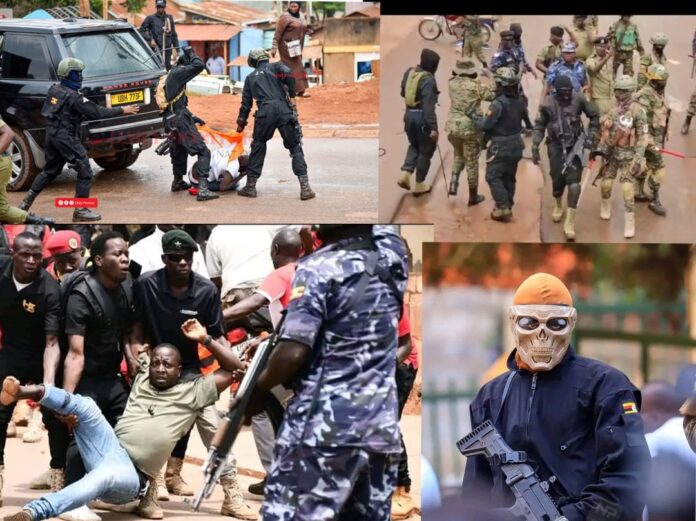By DaglousBakinyumya
| K |
awempe North by-election has come to a point of tension , However it has scars left on Uganda’s democratic process which will linger. What was meant to be a simple electoral exercise quickly turned into a battleground of brutality, intimidation, and suppression?The events that unfolded raise worrying and disturbing question: Is Uganda heading towards an even bloodier 2026 General Election? If a mere by-election could trigger such levels of violence, what should Ugandans expect when the stakes are higher?
A War Zone, Not a By-Election
Kawempe North by-election is marred by shocking levels of state-sponsored brutality. Instead of a peaceful democratic process, it became a show of force by security agencies determined to control the outcome by any means necessary. Armed security personnel swarmed polling stations, turning the exercise into a military operation rather than a civic duty. Reports of ballot stuffing, voter intimidation, and arbitrary arrests flooded social media, exposing the deepening crisis in Uganda’s electoral process.
Journalists, as usual, bore the brunt of this state violence. Several were physically assaulted, their equipment deliberately damaged, and their rights blatantly disregarded. The press, which serves as the fourth state or watchdog of democracy, is treated as an enemy of the state. Cameras were smashed, memory cards confiscated, and reporters left nursing wounds inflicted by those sworn to protect citizens.
One of the most disturbing incidents involved a well-known journalist who was not only beaten but had their camera shattered beyond repair. The officer responsible for the attack did not offer any justification—just brute force meant to silence the media. Such incidents are becoming far too common, raising fears that 2026 might be the bloodiest election Uganda has ever witnessed.
A System That Thrives on Fear and Bloodshed
Uganda’s elections have never been truly free and fair, but the Kawempe North by-election has exposed a dangerous trend. Violence is no longer a last resort—it is now the primary strategy. The government’s message is clear: dissent will be crushed, opposition will be silenced, and the press will be muzzled.
The disturbing part is that this brutality is not just targeted at politicians but at ordinary citizens too. People who turned up to vote were met with tear gas and batons. Those who attempted to document the chaos faced the wrath of an unaccountable security force. The ruling regime is no longer interested in even pretending to uphold democracy. Instead, it is banking on fear, hoping that the sight of bloodshed will discourage people from participating in future elections.
If security agencies can act with such impunity in a by-election, one can only imagine the horrors that wait in 2026. Will Uganda’s streets be littered with the bodies of those who dare to demand change? Will journalists be hunted down and silenced for simply doing their job? The writing is on the wall, and it is terrifying.
Where Is Uganda Headed?
The brutality witnessed in Kawempe North is a grim reminder that Uganda’s democracy is hanging by a thread. The country is steadily slipping into a dictatorship where elections are mere rituals, and violence is the tool used to maintain power. The 2026 General Election will not be a contest of ideas but a war of survival.
What is even more worrying and disturbing is the silence from those who should be holding the government accountable. Where are the voices of condemnation? Where is the outrage from international organizations? Where is the justice for the journalists whose equipment was broken and whose rights were trampled upon? Uganda is being conditioned to accept bloodshed as part of the electoral process, and that is a dangerous precedent.
A Call to Action
Ugandans must not wait until 2026 to resist this escalating brutality. Civil society, opposition parties, and the media must unite to demand accountability now. Every journalist assaulted, every voter intimidated, and every voice silenced is a step closer to complete authoritarian rule.
The international community must also wake up. Statements of concern are not enough. The Ugandan government must be pressured to end police brutality, protect journalists, and ensure that future elections are conducted in a free and fair manner.
As we reflect on the horrors of the Kawempe North by-election, we must ask ourselves: How much blood must be shed before Uganda reclaims its democracy? If nothing is done, 2026 will not be an election—it will be a massacre. The time to act is now.
Daglous Bakinyumya is a Political TV Producer and TV Host – @BDouglasPaapa



